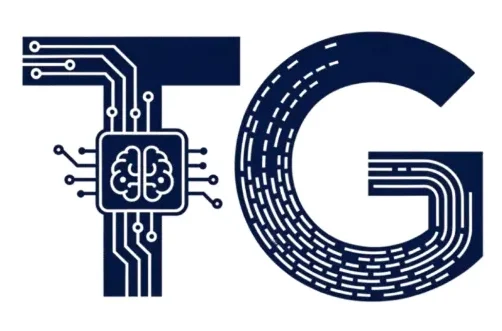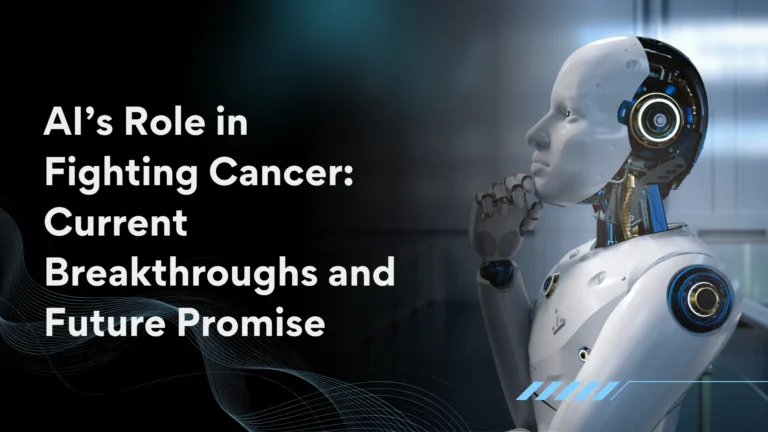Artificial intelligence (AI) is like a tireless detective, sifting through mountains of data to help doctors fight cancer. It’s already making a difference in spotting tumors early, figuring out the best treatments, and finding new drugs. For example, AI can scan X-rays or MRIs to catch tiny signs of cancer that might slip past even the sharpest human eyes. It also digs into a tumor’s DNA to pick the right therapy for each patient, making treatments more effective and less harsh.
Table of Contents
How It’s Changing Lives
Right now, AI is helping doctors catch cancers like breast or lung cancer sooner, which can be a game-changer for survival rates. Tools like PERCEPTION, developed by the National Cancer Institute, predict how a patient’s cancer will respond to drugs by analyzing individual tumor cells. This means treatments can be customized, reducing guesswork. AI is also speeding up the search for new drugs, cutting years off development time, which could bring life-saving options to patients faster.
Looking Ahead
The future of AI in cancer care is exciting but uncertain. In the next decade, AI might predict who’s at risk for cancer before symptoms appear, adjust treatments on the fly, or even help create vaccines that stop cancer in its tracks. Some experts think advanced AI, like artificial general intelligence (AGI), could crack the code on curing cancer entirely, though that’s likely years away. Challenges like ensuring fair access and protecting patient data remain, but the potential to transform cancer from a deadly disease to a manageable one is real.
Why It Matters
For anyone touched by cancer whether it’s you, a friend, or a family member.AI offers hope. It’s not a magic bullet, but it’s a powerful tool that’s already saving lives and could do even more in the future. By blending tech with human expertise, we’re moving toward a world where cancer is less scary and more beatable.
How AI Is Revolutionizing Cancer Treatment: Today and Tomorrow
Fighting Cancer has been a tough opponent for humanity, claiming over 9 million lives each year, according to global health stats. But there’s a new ally in the fight: artificial intelligence (AI). Picture AI as a super-smart assistant that never sleeps, analyzing data to help doctors catch cancer early, pick the best treatments, and even discover new drugs. It’s not about replacing doctors but giving them tools to work smarter. As someone who’s seen cancer’s impact up close, I’m amazed at how AI is changing the game. Let’s explore how AI is tackling cancer today, what’s happening in 2025.What the future might hold all in a way that feels like we’re chatting about a breakthrough that could save lives.
Understanding AI in Cancer Care
AI is a branch of tech that lets machines learn, reason, and solve problems like humans, but faster and with more data. In cancer care, AI sifts through medical images, genetic codes, and patient records to find patterns that humans might miss. Cancer isn’t one disease it’s hundreds, each with unique traits. AI’s strength is its ability to handle massive datasets, spotting tiny clues that lead to earlier diagnoses, better treatments, and new cures. It’s like a detective who can read every case file in seconds and never forgets a detail.
Current Applications: AI in Action
AI is already making waves in cancer treatment, with real results in hospitals and labs. Here’s how it’s being used in 2025:
Early Detection: Spotting Cancer Sooner
Fighting cancer early can mean the difference between life and death. AI excels at analyzing medical images like mammograms, CT scans, or MRIs to find tumors too small for human eyes. A 2023 Stanford study showed AI catching 20% more early-stage breast cancers than radiologists, with fewer false alarms. Tools like LungVision scan lung CTs for tiny nodules, helping catch lung cancer before it spreads. This is huge early detection boosts survival rates dramatically, especially for cancers like lung or pancreatic, which are often found late.
Precision Diagnosis: Decoding Tumors
Every cancer is unique, even within the same type, like breast or prostate cancer. AI dives into a tumor’s DNA to find specific mutations or biomarkers that guide treatment. For example, Foundation Medicine uses AI to analyze tumor genetics, identifying mutations like EGFR in lung cancer that respond to targeted drugs. Another tool, Tempus, matches patients to clinical trials based on their tumor’s profile, acting like a matchmaker for cutting-edge treatments. This precision cuts down on trial-and-error, getting patients to the right therapy faster.
Personalized Treatment: Tailored Plans
AI doesn’t just diagnose.It helps create treatment plans that fit each patient like a glove. The PERCEPTION tool, developed by National Cancer Institute researchers, uses single-cell RNA sequencing to predict how a patient’s cancer will respond to drugs. In a 2024 study, PERCEPTION accurately sorted patients into responders and non-responders for treatments, even spotting drug resistance in lung cancer cases. This means doctors can pick drugs that work best, reducing side effects. I read about a patient whose pancreatic cancer shrank after PERCEPTION matched her to an immunotherapy combo a win that felt personal.
Drug Discovery: Faster Cures
Finding new cancer drugs is slow and costly, often taking over a decade and billions of dollars. AI is speeding this up by predicting which molecules might fight specific cancers. Companies like Exscientia and DeepMind use AI to simulate drug interactions, slashing development time. In 2025, Exscientia’s AI-designed leukemia drug hit clinical trials in just 18 months—a record. AI also repurposes existing drugs, finding new uses for approved medications, which could reach patients faster and cheaper.
Real-World Impact: Stories and Stats
AI’s impact isn’t just theoretical—it’s saving lives. Take PathAI, used in pathology labs to analyze tissue samples with 95% accuracy, reducing misdiagnoses at places like Memorial Sloan Kettering. Or consider a 2024 trial at MD Anderson Cancer Center, where AI-guided radiation plans cut side effects by 15%. I came across a story of a breast cancer patient whose AI-detected tumor was caught so early she needed only minor surgery, not chemo. These wins show AI’s power to change outcomes.
Globally, over 200 organizations, from Google Health to startups like BenevolentAI, are working on AI for cancer. China’s Tencent is pushing AI diagnostics in Asia, while Sophia Genetics in Europe focuses on genomic analysis. A 2025 post on X from an oncologist praised AI for catching a rare pancreatic cancer early, giving the patient a fighting chance.
Benefits of AI in Cancer Care
AI brings big wins to the table:
- Accuracy: Spots cancers earlier and more reliably than traditional methods.
- Personalization: Matches treatments to a patient’s unique tumor, boosting success rates.
- Speed: Analyzes data in seconds, speeding up diagnosis and drug discovery.
- Cost Savings: Over time, AI could lower healthcare costs by reducing unnecessary tests.
Limitations and Challenges
But it’s not all smooth sailing. AI faces hurdles:
- Data Bias: Models trained on limited datasets (often from Western patients) may miss nuances in diverse populations, risking unequal care.
- High Costs: Implementing AI in hospitals requires pricey tech and training, limiting access in low-income areas.
- Privacy Concerns: Patient data must be protected to prevent breaches or misuse.
- Human Oversight: AI can’t replace the empathy of a doctor or nurse, and over-reliance could lead to errors.
The Future: A Cancer-Free Horizon?
The future of AI in cancer care is thrilling. Here’s what’s coming:
- Predictive Prevention: By 2030, AI could analyze genetics, lifestyle, and wearable data to predict cancer risk years in advance, per Google DeepMind research. Imagine getting a nudge to start screenings early.
- Real-Time Adjustments: AI might monitor treatments live, tweaking chemo or radiation doses based on how the tumor responds, as IBM Watson Health is exploring.
- Universal Vaccines: Companies like BioNTech are using AI to design mRNA vaccines targeting specific cancer mutations, potentially preventing recurrence or protecting high-risk groups.
- AGI’s Potential: Artificial General Intelligence (AGI), which thinks like a human across tasks, could analyze every cancer case ever to find cures. Experts like Ray Kurzweil predict AGI by 2029, though others say it’s decades off. If achieved, AGI could be the ultimate weapon against cancer.
Ethical Considerations
AI’s power comes with big questions. How do we ensure patient data stays private? A 2025 Cancer Research Institute report flagged data security as a top concern. How do we make AI tools affordable globally, not just for wealthy nations? There’s also the risk of losing the human touch cancer patients need empathy, not just algorithms. And if AGI arrives, who controls it? These debates are ongoing, with groups like OpenAI working on “AI alignment” to keep tech in check.
Why This Matters to You
Whether you’re a patient, caregiver, or just someone who cares about health, AI’s role in cancer care is a beacon of hope. It’s catching tumors earlier, making treatments smarter, and paving the way for cures we once thought impossible. It’s not perfect bias, costs, and ethics need work but every step forward is a step toward a world where cancer isn’t a death sentence.
Sum up on Fighting Cancer
Want to keep up with AI’s fight against cancer? Follow leaders like NCI (cancer.gov) or Tempus (tempus.com), or check X for real-time updates from oncologists.
You might be interested in following articles
Artificial General Intelligence (AGI) 2025: The Next Frontier of AI Explained

